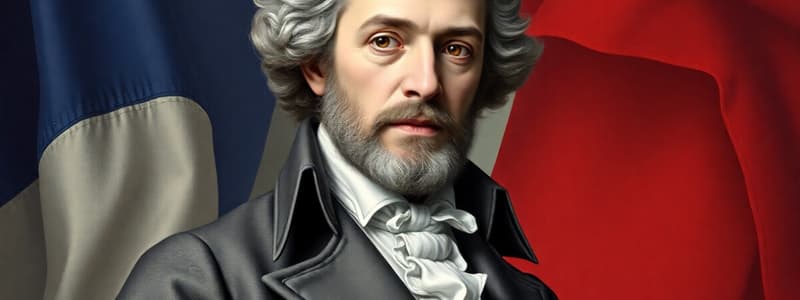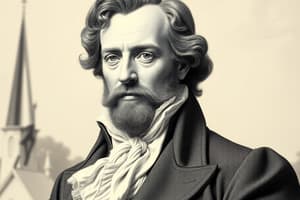Podcast
Questions and Answers
Which symbol was actively promoted as part of the new Britain after the Act of Union?
Which symbol was actively promoted as part of the new Britain after the Act of Union?
- The British flag (Union Jack) (correct)
- The Irish harp
- The Scottish thistle
- The Welsh dragon
What was one consequence of the Act of Union in 1707?
What was one consequence of the Act of Union in 1707?
- It allowed Scotland to impose its own laws independently.
- It led to the independence of Ireland from England.
- It provided Scotland with equal representation in the British Parliament.
- It resulted in the unification of England and Scotland into the United Kingdom of Great Britain. (correct)
What role did female figures play in the representation of nations during the eighteenth and nineteenth centuries?
What role did female figures play in the representation of nations during the eighteenth and nineteenth centuries?
- They symbolized ideas such as Liberty and Justice. (correct)
- They represented economic power and trade routes.
- They were portrayed as mythological creatures.
- They were depicted as warriors leading battles.
What characterized the Balkans region in the last quarter of the nineteenth century?
What characterized the Balkans region in the last quarter of the nineteenth century?
What was a significant outcome of nationalism and imperialism by 1914?
What was a significant outcome of nationalism and imperialism by 1914?
What did Frédéric Sorrieu's first print depict?
What did Frédéric Sorrieu's first print depict?
What concepts were introduced during the French Revolution in relation to nationalism?
What concepts were introduced during the French Revolution in relation to nationalism?
Which flag was chosen as a symbol of France during the rise of nationalism?
Which flag was chosen as a symbol of France during the rise of nationalism?
Which class was dominant politically and socially in early nineteenth-century Europe?
Which class was dominant politically and socially in early nineteenth-century Europe?
What was one significant outcome of nationalism in Europe during the nineteenth century?
What was one significant outcome of nationalism in Europe during the nineteenth century?
How did Napoleon impact democracy in France?
How did Napoleon impact democracy in France?
Which elements were depicted as lying in the foreground of Sorrieu’s print?
Which elements were depicted as lying in the foreground of Sorrieu’s print?
What was one of the key drivers of nationalism in countries like Germany, Italy, and Switzerland during the nineteenth century?
What was one of the key drivers of nationalism in countries like Germany, Italy, and Switzerland during the nineteenth century?
What was a key characteristic of liberal nationalism?
What was a key characteristic of liberal nationalism?
Who was the chief minister responsible for the unification of Germany?
Who was the chief minister responsible for the unification of Germany?
Which event marked the beginning of the revolutions in 1848?
Which event marked the beginning of the revolutions in 1848?
What was a significant outcome of the Zollverein?
What was a significant outcome of the Zollverein?
During the 1830s in Europe, what economic issue primarily affected the population?
During the 1830s in Europe, what economic issue primarily affected the population?
What role did culture play in nationalist movements?
What role did culture play in nationalist movements?
Which of the following was NOT a demand of the liberal middle class in 1848?
Which of the following was NOT a demand of the liberal middle class in 1848?
What was the outcome of the Frankfurt Assembly?
What was the outcome of the Frankfurt Assembly?
Which social group emerged as a result of industrialization?
Which social group emerged as a result of industrialization?
What was one major criticism of the new conservative order by liberal nationalists?
What was one major criticism of the new conservative order by liberal nationalists?
Which societal change did conservatives in 1815 support?
Which societal change did conservatives in 1815 support?
What led to the unification of Italy in the 19th century?
What led to the unification of Italy in the 19th century?
Which characteristic was prominent in the Romantic movement during the rise of nationalism?
Which characteristic was prominent in the Romantic movement during the rise of nationalism?
What did the term 'liberalism' originally derive from?
What did the term 'liberalism' originally derive from?
Flashcards
Nationalism's impact
Nationalism's impact
Nationalism significantly changed European political and mental landscapes, leading to the formation of nation-states.
Sorrieu's vision
Sorrieu's vision
Sorrieu's prints depicted a world of democratic and social republics, emphasizing fraternity among nations.
French Revolution & Nation
French Revolution & Nation
The French Revolution shifted sovereignty from the monarchy to citizens, introducing concepts like 'patrie' and 'citizen'.
Napoleonic Code
Napoleonic Code
Signup and view all the flashcards
Pre-19th c. Europe (divided)
Pre-19th c. Europe (divided)
Signup and view all the flashcards
European Aristocracy
European Aristocracy
Signup and view all the flashcards
Industrial Revolution (start)
Industrial Revolution (start)
Signup and view all the flashcards
Nation-state
Nation-state
Signup and view all the flashcards
United Kingdom Formation
United Kingdom Formation
Signup and view all the flashcards
Nationalism as a Personification
Nationalism as a Personification
Signup and view all the flashcards
The Rise of Nationalism
The Rise of Nationalism
Signup and view all the flashcards
Balkan Powder Keg
Balkan Powder Keg
Signup and view all the flashcards
Imperialism and World War I
Imperialism and World War I
Signup and view all the flashcards
What is liberalism?
What is liberalism?
Signup and view all the flashcards
Who could vote in early liberal societies?
Who could vote in early liberal societies?
Signup and view all the flashcards
Zollverein
Zollverein
Signup and view all the flashcards
What did conservatives believe in?
What did conservatives believe in?
Signup and view all the flashcards
What strengthened European monarchies?
What strengthened European monarchies?
Signup and view all the flashcards
Vienna Congress (1815)
Vienna Congress (1815)
Signup and view all the flashcards
Liberal Nationalist Complaint
Liberal Nationalist Complaint
Signup and view all the flashcards
What did revolutionaries fight for?
What did revolutionaries fight for?
Signup and view all the flashcards
Giuseppe Mazzini & Young Italy
Giuseppe Mazzini & Young Italy
Signup and view all the flashcards
What sparked the July Revolution (1830)?
What sparked the July Revolution (1830)?
Signup and view all the flashcards
Role of Culture in Nationalism
Role of Culture in Nationalism
Signup and view all the flashcards
Language and Nationalism
Language and Nationalism
Signup and view all the flashcards
What caused revolts in the 1830s?
What caused revolts in the 1830s?
Signup and view all the flashcards
What did the 1848 revolution demand?
What did the 1848 revolution demand?
Signup and view all the flashcards
Frankfurt Parliament (1848)
Frankfurt Parliament (1848)
Signup and view all the flashcards
Study Notes
Frédéric Sorrieu's Vision of a United Europe
- Sorrieu, a French artist, created prints in 1848 showcasing a unified world of democratic republics.
- The prints depicted European and American figures paying homage to a Statue of Liberty, symbolizing Enlightenment and liberal ideals.
- Shattered symbols of absolutism represented the demise of old order.
- Nations were depicted by distinct flags and costumes. The procession was led by figures from the US, Switzerland, France, and parts of Germany, Austria, Italy, Poland, England, Ireland, Hungary, and Russia.
- Religious figures (Christ, saints, and angels) symbolized fraternity among nations.
The French Revolution and the Idea of the Nation
- Nationalism emerged with the French Revolution (1789).
- Sovereignty shifted from the monarchy to citizens. Concepts like "la patrie" (fatherland) and "le citoyen" (citizen) were introduced.
- The tricolor flag replaced the former French flag.
- Napoleon curtailed democracy in France.
- The Napoleonic Code (1804) established equality before the law and protected property rights, abolishing birth-based privileges.
The Making of Nationalism in Europe
- Europe was divided into kingdoms, duchies, and cantons with autonomous rulers.
- Aristocracy held social and political power.
- Peasantry comprised the majority.
- Industrialization in England (late 18th century) created new social classes: working class and middle class (industrialists, businessmen, professionals).
Liberal Nationalism
- Liberalism emphasis on freedom, derived from Latin "liber" (free).
- Limited suffrage rights: property-owning men were eligible to vote and run.
- Zollverein (1834), a customs union in Prussia, unified German states by abolishing tariffs, reducing currencies.
A New Conservatism after 1815
- Post-1815, European governments favored conservatism, supporting monarchy, the Church, social hierarchy, and property rights.
- Strengthening powers of autocratic monarchs: modern army, efficient bureaucracy, dynamic economy, elimination of feudalism and serfdom.
- The Congress of Vienna (1815) redrew Europe's borders, restored Bourbon dynasty in France and limited French influence.
Revolutionaries
- Secret societies were formed in many European states, opposing monarchies and advocating for liberty and freedom.
- Giuseppe Mazzini (1807-1872) founded "Young Italy" and later "Young Europe" to promote national unity across political state lines.
The Age of Revolutions (1830-1848)
- July Revolution (1830) in France overthrew the Bourbon monarchy and established a constitutional monarchy.
- Belgian independence from the Netherlands stemmed from 1830 uprisings.
- Greek struggle for independence (1821).
Romantic Nationalism
- Culture (art, poetry, stories, music) fostered nationalist sentiment.
- Romanticism sought to develop, shape national sentiments.
- Language played a key role in nationalism.
Economic Hardships and Popular Revolt
- Economic hardship in 1830s Europe.
- Population increase, poor harvests led to widespread poverty.
- 1848 Paris uprisings fueled by food shortages and unemployment.
The Revolution of 1848 and Liberalism
- 1848 revolutions led by the middle class.
- Demands for national state based on parliamentary principles: constitution, free press, free association.
- Frankfurt Parliament (May 1848) aimed to unify Germany under a monarchy with parliamentary oversight.
- Parliament failed to unite Germany as many monarchs opposed the assembly.
The Making of Germany and Italy
- Germany and Italy unified as nation-states after 1848.
- Prussia led the German unification movement.
- Otto von Bismarck and the Prussian army/bureaucracy facilitated unification.
- 1871: Prussian King proclaimed German Emperor.
- Modernization of German systems (currency, banking, law).
- Italy: Divided into seven states. Sardinia-Piedmont was among them, ruled by an Italian princely house.
- Cavour led the unification movement, defeating Austria and securing local support.
- 1861: Victor Emmanuel II proclaimed king of united Italy.
The Strange Case of Britain
- Britain acted as a model nation—becoming powerful and wealthy.
- Act of Union (1707) between England and Scotland formed the "United Kingdom of Great Britain."
- Ireland was incorporated into the UK in 1801.
- British symbols (flag, anthem, language) were promoted.
Visualising the Nation
- Artists of the 18th and 19th centuries represented nations with personified female figures.
Nationalism and Imperialism
- Intense rivalry amongst European powers due to trade, colonies, naval/military might.
- Balkan region (modern-day countries like Romania, Bulgaria etc) became a conflict zone due to the Ottoman Empire's instability and influence.
- Nationalistic conflicts culminated in World War I (1914).
Studying That Suits You
Use AI to generate personalized quizzes and flashcards to suit your learning preferences.
Description
Explore Frédéric Sorrieu's artistic vision, depicting a united Europe through democratic ideals. Discover how the French Revolution influenced nationalism and shifted sovereignty to citizens, marking a significant change in identity and governance.




